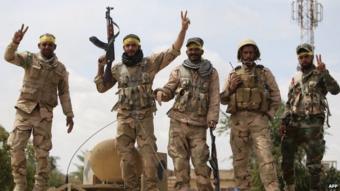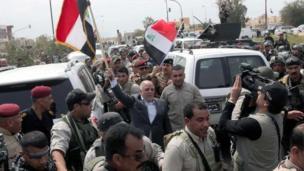In Syria's war, Alawites pay heavy price for loyalty to Bashar al-Assad
The Alawites, the Assad family's sect, have seen up to a third of their young men killed in the Syrian conflict and mothers are now refusing to send their sons to war
By Ruth Sherlock, Beirut
07 Apr 2015
In the Assad regime's heartland, dead officers are sent home in ambulances, while the corpses of ordinary soldiers are returned in undecorated pick-up trucks.
Then come the press gangs: military recruiters raid houses to find replacements by force for the dwindling ranks of
Syria's military.
Sharing their sect with
President Bashar al-Assad, Alawites have
long been the core constituency for the Syrian regime. As the
civil war drags into its fifth year, the minority sect is seen by opposition rebels as remaining unwaveringly loyal.
But from inside the community, the picture looks very different: as their sons die in droves on the front lines, and economic privileges – subsidies and patronage – cease,
Alawites increasingly feel they are tools and not the beneficiaries of the regime.
In a series of exclusive interviews, Alawites from the coastal province of Latakia, the sect's heartland, have told the Telegraph of how they are now trapped between jihadists who consider them apostates, and a remote and corrupt regime that told them the war would be easy to win.
"Most don't have salaries now, and some don't even have food to eat," said Ammar, a businessman in Latakia. "My friends ask me: 'Mr Ammar what shall we do? The regime wants to take us as soldiers. We will die. But we don't have the money to get out'."
The scale of the sect's losses is staggering: with a population of around two million, a tenth of Syria's population, the Alawites boast perhaps 250,000 men of fighting age. Today as many as one third are dead, local residents and Western diplomats say.
Many Alawite villages nestled in the hills of their ancestral Latakia province are all but devoid of young men. The women dress only in mourning black.
"Every day there at least 30 men returned from the front lines in coffins," said Ammar, who spoke to the Telegraph using a pseudonym to protect himself and his family.
"In the beginning of the war their deaths were celebrated with big funerals. Now they are quietly dumped in the back of pick-up trucks."
The
Syrian government has not published official figures on its war dead. Syrian state television mostly fails to broadcast news of Alawite soldiers killed, instead playing up the deaths of their Sunni comrades, in a bid to shore up
Sunni support.
A report by the opposition Syrian Network for Human Rights published at the end of last year found that pro-government fighting groups have suffered the greatest proportion of casualties , with over 22,000 soldiers and militiamen killed in 2014 alone.
A disproportionate number of those are Alawites: "In battles with Sunni armed groups, the government doesn't trust their Sunni soldiers not to defect," said one Alawite resident, a former soldier, who asked not to be named. "So the Alawites are sent forward."
The loss of life is causing a quiet rebellion among many in the sect: vilified by the increasingly extremist rebel opposition, most still feel they have little choice but to remain wedded to the regime. But it is an alliance tinged with hatred.
A female resident in Latakia city, also speaking anonymously, said: "Mothers are caring for their children more than for Bashar, and have started trying to hide them away."
Pushed to breaking point, and inspired by the instinct to protect, residents recounted cases where women set up "road blocks" at the entrances to some of the mountain villages to prevent the army from forcibly taking their sons to the military draft.
"They told the military commanders: 'Go and bring the sons of the big shots to war and after that we will give you our children'," said Ammar, citing one such protest where he was present.
The community is also the focus of the rebel movement, which is now dominated by Sunni jihadists who regard the Alawites as non-believers. They
openly boast of their desire to "purge" what they describe as "dangerous filth'" from the country.
Alawites, who split from the Shia branch of the Islamic faith in the ninth century, believe prayers are not necessary and do not fast or perform pilgrimages. Many of the key tenets of the faith are secret, adding to their mystique but also fuelling the myths peddled by their opponents.
A tough, mountain race who were originally considered something of an underclass, the Alawites rose to power after the fall of the Ottoman Empire, when Syria's French rulers needed soldiers willing to defend the regime from a Sunni uprising. They found willing recruits in the Alawites, who were only too happy to fight their Sunni "oppressors".
Their growing strength in the military led
Hafez al-Assad, a general, to seize power, which he then handed to his son, Bashar. Since then the Assad regime has enriched individuals within the sect, disproportionately appointing its men to senior political, military and financial positions.
The majority of Alawites, however, are still extremely poor.
"Assad didn't improve our salaries during his reign," said one Alawite resident. "In my village there are only a few villas dotted among hundreds of basic houses."
As the war continues with no clear end in sight, the collapse of the Syrian economy is forcing the poor into destitution.
The regime has cut subsidies that were keeping many families afloat. Electricity is intermittent in Latakia city and often cut off in the mountains. Fuel for transport and heating is expensive and hard to come by.
Local war lords are growing increasingly powerful, as men join their ranks, refusing to be sent with the military to fight in areas of the country where Alawites have almost no presence.
In their fiefdoms, the war lords are increasingly independent. The militia leaders feel able to refuse orders from commanders sent from Damascus, according to Joshua Landis, a professor of history at the University of Oklahoma who has regular contact with Syrian members of the sect.
Several members of the Assad family, once too powerful to touch, have died in Latakia in murky circumstances, that some have interpreted as a competition by others for money and local power.
Mystery surrounds the death of Muhammad al-Assad last month, a well known second cousin of President Assad, and once a feared member of
the shabiha, a smuggling mafia that emerged from the Assad family in rural Latakia in the 1980s.
Nonetheless, most of the Alawite community still believes that any actions that would seriously weaken the regime could result in their villages being overrun by an opposition hell-bent on sectarian revenge.
So, they keep their heads down, suffering in silence as their sons return in body bags.
Mohammed, the taxi driver said: "No one is smiling in Latakia now: every family has lost someone," he said. "The angel of death is working well."
http://www.telegraph.co.uk/news/wor...avy-price-for-loyalty-to-Bashar-al-Assad.html




